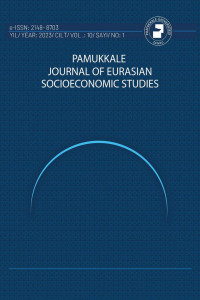The Construction of the Curriculum with Political Study from the Perspective of the Holistic Governance
Abstract
Curriculum with political study is the major institutional innovation of the ideological and political education reform in China in the new era. As the transboundary affairs,the curriculum with political study faces the fragmentation problems in cognition,subject,resources and participation. Based on the theory of holistic governance,the curriculum with political study should establish four mechanisms of trust,integration,coordination and participation in order to share the values and resources of the political education and improve the ability of the political education among all the Chinese universities.
References
- Bogdanor,(2005). Introduction In Bogdanor: Joined-up government[M].Oxford:Oxford University Press.
- Coenraad, M. (2022). Using participatory design to integrate stakeholder voices in the creation of a culturally relevant computing curriculum[J]. International Journal of Child-Computer Interaction, (31): 100-121.
- Gao, X., Song, Y. F., & Zhu, X. R. (2013). Integration and coordination: Advancing China’s fragmented e-government to holistic governance[J]. Government Information Quarterly, 30(2): 173-181.
- Jonker, H. (2019). Collaboration in teacher design teams: Untangling the relationship between experiences of the collaboration process and perceptions of the redesigned curriculum[J]. Studies in Educational Evaluation, (61): 138-149.
- Ling,T. (2002). Delivering Joined-up government in the UK:Dimensions, Issues and Problems [J].Public Administration, 80(4): 638-639.
- March, J.G.& Olsen, J.P. (1983). Organizing Political Life[J]. American Political Science Review: 77(2): 281-296.
- Nussbaum, M. (2010). Not for Profit: Why Democracy Needs the Humanities[M]. Peking: Xinhua Press: 2-3.
- Qıu, W. (2017). The Value Definition and the Forming Solution of the Curriculum with Political Study[J]. Ideological and Political Education, (7): 10-14.
- Shı, Y. & Zhou, Q. (2014). The Holistic Governance: Review and Trend[J]. Journal of Tianjin Administration Institute, (5): 3-8.
- Six, P. (2002). Towards Holistic Governance: The New Reform Agenda[M]. London: Palgrave Press, 48.
- Six, P. (2004). Viable Institutions and Scope for Incoherence. The Value of Inconsistency[M]. Villa Margherita, Venice, Italy,13.
- Six, P., Leat, D. Seltzer, K., & Stoke, G. (2002). Towards Holistic Governance: The New Reform Agenda[M]. London: Palgrave Press, 33.
- Wu. A. P. (2020) The cooperation: Research on the Social Solution of the Curriculum with Political Study in High Education[J]. High Education Research, (2): 153-156.
- Xiaofang, E., & Jocelyn, W. (2023). Tracing teacher knowledge transformation across multiple levels in collaborative curriculum design: A comparative case study in China[J]. International Journal of Educational Research, (118): 102-153.
- Zeng, F. J., & Wei, S. (2010). The Holistic Governance: the Governance Logic of the Service Style Government[J]. Journal of Guangdong Administration Institute, (1): 22-25.)
- Zhu, Q. (2008). From Public Administration to Holistic Governance[J]. Chinese Public Administration, (10): 52-58.
The Construction of the Curriculum with Political Study from the Perspective of the Holistic Governance
Abstract
Curriculum with political study is the major institutional innovation of the ideological and political education reform in China in the new era. As the transboundary affairs,the curriculum with political study faces the fragmentation problems in cognition,subject,resources and participation. Based on the theory of holistic governance,the curriculum with political study should establish four mechanisms of trust,integration,coordination and participation in order to share the values and resources of the political education and improve the ability of the political education among all the Chinese universities.
References
- Bogdanor,(2005). Introduction In Bogdanor: Joined-up government[M].Oxford:Oxford University Press.
- Coenraad, M. (2022). Using participatory design to integrate stakeholder voices in the creation of a culturally relevant computing curriculum[J]. International Journal of Child-Computer Interaction, (31): 100-121.
- Gao, X., Song, Y. F., & Zhu, X. R. (2013). Integration and coordination: Advancing China’s fragmented e-government to holistic governance[J]. Government Information Quarterly, 30(2): 173-181.
- Jonker, H. (2019). Collaboration in teacher design teams: Untangling the relationship between experiences of the collaboration process and perceptions of the redesigned curriculum[J]. Studies in Educational Evaluation, (61): 138-149.
- Ling,T. (2002). Delivering Joined-up government in the UK:Dimensions, Issues and Problems [J].Public Administration, 80(4): 638-639.
- March, J.G.& Olsen, J.P. (1983). Organizing Political Life[J]. American Political Science Review: 77(2): 281-296.
- Nussbaum, M. (2010). Not for Profit: Why Democracy Needs the Humanities[M]. Peking: Xinhua Press: 2-3.
- Qıu, W. (2017). The Value Definition and the Forming Solution of the Curriculum with Political Study[J]. Ideological and Political Education, (7): 10-14.
- Shı, Y. & Zhou, Q. (2014). The Holistic Governance: Review and Trend[J]. Journal of Tianjin Administration Institute, (5): 3-8.
- Six, P. (2002). Towards Holistic Governance: The New Reform Agenda[M]. London: Palgrave Press, 48.
- Six, P. (2004). Viable Institutions and Scope for Incoherence. The Value of Inconsistency[M]. Villa Margherita, Venice, Italy,13.
- Six, P., Leat, D. Seltzer, K., & Stoke, G. (2002). Towards Holistic Governance: The New Reform Agenda[M]. London: Palgrave Press, 33.
- Wu. A. P. (2020) The cooperation: Research on the Social Solution of the Curriculum with Political Study in High Education[J]. High Education Research, (2): 153-156.
- Xiaofang, E., & Jocelyn, W. (2023). Tracing teacher knowledge transformation across multiple levels in collaborative curriculum design: A comparative case study in China[J]. International Journal of Educational Research, (118): 102-153.
- Zeng, F. J., & Wei, S. (2010). The Holistic Governance: the Governance Logic of the Service Style Government[J]. Journal of Guangdong Administration Institute, (1): 22-25.)
- Zhu, Q. (2008). From Public Administration to Holistic Governance[J]. Chinese Public Administration, (10): 52-58.
Details
| Primary Language | English |
|---|---|
| Subjects | Public Administration |
| Journal Section | Research Article |
| Authors | |
| Publication Date | June 30, 2023 |
| Published in Issue | Year 2023 Volume: 10 Issue: 1 |
Cite

This work is licensed under a Creative Commons Attribution-NonCommercial-NoDerivatives 4.0 International License


